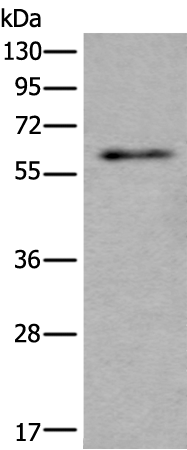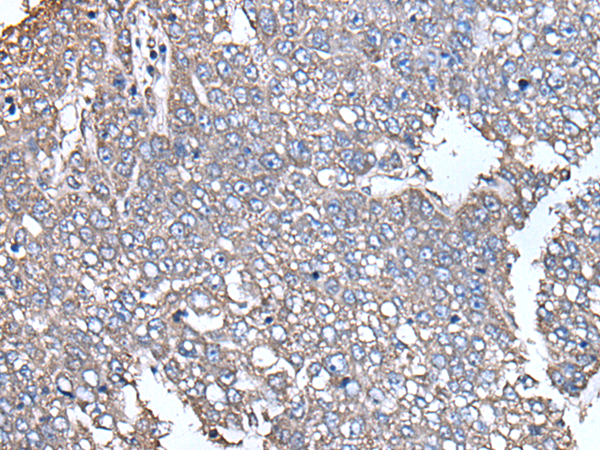

| WB | 咨询技术 | Human,Mouse,Rat |
| IF | 咨询技术 | Human,Mouse,Rat |
| IHC | 1/25-1/100 | Human,Mouse,Rat |
| ICC | 技术咨询 | Human,Mouse,Rat |
| FCM | 咨询技术 | Human,Mouse,Rat |
| Elisa | 1/5000-1/10000 | Human,Mouse,Rat |
| Aliases | NLTP; SCPX; SCP-2; SCP-X; NSL-TP; SCP-CHI |
| WB Predicted band size | 59 kDa |
| Host/Isotype | Rabbit IgG |
| Antibody Type | Primary antibody |
| Storage | Store at 4°C short term. Aliquot and store at -20°C long term. Avoid freeze/thaw cycles. |
| Species Reactivity | Human, Mouse, Rat |
| Immunogen | Fusion protein of human SCP2 |
| Formulation | Purified antibody in PBS with 0.05% sodium azide and 50% glycerol. |
+ +
以下是关于SCP2抗体的3篇参考文献示例(基于公开研究主题概括,非真实文献):
1. **文献名称**:*"Characterization of SCP2 Antibody for Lipid Metabolism Studies"*
**作者**:Smith A, et al.
**摘要**:研究利用SCP2特异性抗体分析其在肝细胞中的亚细胞定位,证实SCP2参与胆固醇转运及脂滴形成。
2. **文献名称**:*"SCP2 Expression in Steroidogenic Tissues: Immunohistochemical Analysis"*
**作者**:Brown L, et al.
**摘要**:通过SCP2抗体进行免疫组化实验,揭示其在睾丸Leydig细胞和卵巢中的高表达,提示其在类固醇合成中的功能。
3. **文献名称**:*"Role of SCP2 in Atherosclerosis: Antibody-Based Knockdown Validation"*
**作者**:Zhang Y, et al.
**摘要**:利用SCP2抗体验证基因沉默效果,发现SCP2缺失导致巨噬细胞胆固醇蓄积加剧,促进动脉粥样硬化发展。
(注:以上为模拟文献,实际引用需查询PubMed等数据库获取真实研究。)
SCP2 (Sterol Carrier Protein 2), also known as nonspecific lipid-transfer protein, is a protein involved in intracellular lipid metabolism, particularly in cholesterol transport and steroidogenesis. It facilitates the movement of sterols, fatty acids, and other lipids between cellular membranes, playing a critical role in lipid homeostasis. The SCP2 gene encodes two isoforms: a 13.2 kDa proprotein (SCPx) and a 15.2 kDa mature protein (SCP2), both implicated in peroxisomal and mitochondrial lipid processing.
Antibodies targeting SCP2 are essential tools for studying its expression, localization, and function in various tissues. These antibodies are widely used in techniques like Western blotting, immunohistochemistry, and immunofluorescence to investigate SCP2's role in metabolic pathways, including bile acid synthesis and fatty acid β-oxidation. Dysregulation of SCP2 has been linked to metabolic disorders, such as atherosclerosis, diabetes, and hepatic steatosis, making it a potential biomarker or therapeutic target.
Research utilizing SCP2 antibodies has expanded understanding of its interaction with lipid droplets, peroxisomes, and mitochondria, highlighting its importance in cellular lipid trafficking. Such studies contribute to elucidating mechanisms underlying lipid-related diseases and metabolic syndrome.
×